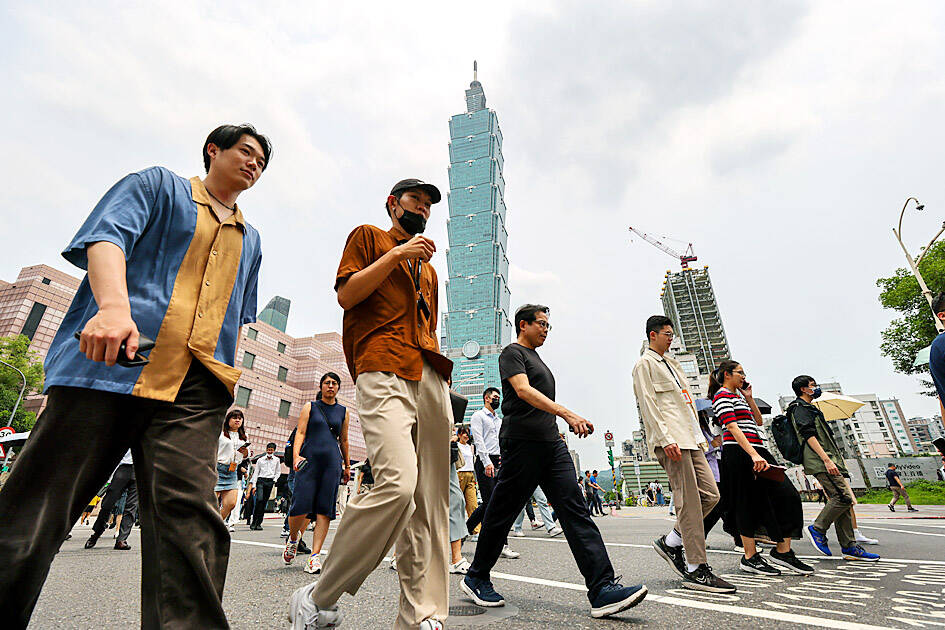Moody’s Ratings and S&P Global Ratings have reaffirmed Taiwan’s sovereign credit ratings at “As3” and “AA+” respectively with a stable outlook on the back of high income and wealth levels, a strong institutional framework and robust external positions.
The affirmations came as Taiwan’s economy is gaining momentum after quarters of slowdown induced by stubborn global inflation and monetary tightening.
Taiwan’s strong fiscal and external buffers have improved relative to peers as evidenced by recent shocks linked to the COVID-19 pandemic and the ongoing US-China technology dispute, the two ratings firms said.

Photo: Ritchie B. Tongo, EPA-EFE
“Taiwan stands as the epicenter of the global semiconductor supply chain, accounting for over 60 percent of global production and the majority of manufacturing capacity of the world’s most advanced chips,” Moody’s said on Tuesday.
Such dominance in semiconductor production and the peripheral electronics sector has supported Taiwan’s economic competitiveness and resilience, with a near monopoly on the production of advanced chips, and promised stability and growth in an otherwise highly cyclical industry, it said.
Taiwan would benefit further from long-term prospects for the chip industry and take up the lion’s share of a growing pie as emerging technologies with commercial and military applications continue to demand more powerful and faster processing and memory capabilities, it said.
In addition, Taiwan has demonstrated economic stability, fiscal health and monetary flexibility through recent shocks, the two global ratings agencies said.
Taiwan’s fiscal policy effectiveness has strengthened as exemplified by its adherence to fiscal discipline and the lowering of its debt burden, when other similarly rated peers have seen their debts rising higher than pre-pandemic levels, Moody’s said.
Although the Taiwanese market is fraught with ample liquidity, the central bank’s sound monetary management has kept inflation at stable and relatively low levels, S&P said yesterday.
Taiwan has one of the lowest interest rates worldwide even though imported inflationary pressure has built up due to rising international prices for raw materials, S&P said.
The central bank’s rate hike in March would help keep inflation at 2.16 percent this year, although a weak local currency and recent hikes in electricity tariffs lend support to inflation expectations, S&P said.
Nevertheless, Taiwan’s longstanding sovereignty dispute with China would limit the chance of upside surprises, the two agencies said.
US-China tensions have grown from trade to technological competition and geopolitical influence. Taiwan’s unique position as a dominant player in the semiconductor supply chain increases its relevance to both superpowers, Moody’s and S&P said.
Volatile cross-strait developments would pose risks that constrain Taiwan’s credit profile, but the probability of a large-scale military conflict is low, they said.

Intel Corp chief executive officer Lip-Bu Tan (陳立武) is expected to meet with Taiwanese suppliers next month in conjunction with the opening of the Computex Taipei trade show, supply chain sources said on Monday. The visit, the first for Tan to Taiwan since assuming his new post last month, would be aimed at enhancing Intel’s ties with suppliers in Taiwan as he attempts to help turn around the struggling US chipmaker, the sources said. Tan is to hold a banquet to celebrate Intel’s 40-year presence in Taiwan before Computex opens on May 20 and invite dozens of Taiwanese suppliers to exchange views

Application-specific integrated circuit designer Faraday Technology Corp (智原) yesterday said that although revenue this quarter would decline 30 percent from last quarter, it retained its full-year forecast of revenue growth of 100 percent. The company attributed the quarterly drop to a slowdown in customers’ production of chips using Faraday’s advanced packaging technology. The company is still confident about its revenue growth this year, given its strong “design-win” — or the projects it won to help customers design their chips, Faraday president Steve Wang (王國雍) told an online earnings conference. “The design-win this year is better than we expected. We believe we will win

Chizuko Kimura has become the first female sushi chef in the world to win a Michelin star, fulfilling a promise she made to her dying husband to continue his legacy. The 54-year-old Japanese chef regained the Michelin star her late husband, Shunei Kimura, won three years ago for their Sushi Shunei restaurant in Paris. For Shunei Kimura, the star was a dream come true. However, the joy was short-lived. He died from cancer just three months later in June 2022. He was 65. The following year, the restaurant in the heart of Montmartre lost its star rating. Chizuko Kimura insisted that the new star is still down

While China’s leaders use their economic and political might to fight US President Donald Trump’s trade war “to the end,” its army of social media soldiers are embarking on a more humorous campaign online. Trump’s tariff blitz has seen Washington and Beijing impose eye-watering duties on imports from the other, fanning a standoff between the economic superpowers that has sparked global recession fears and sent markets into a tailspin. Trump says his policy is a response to years of being “ripped off” by other countries and aims to bring manufacturing to the US, forcing companies to employ US workers. However, China’s online warriors